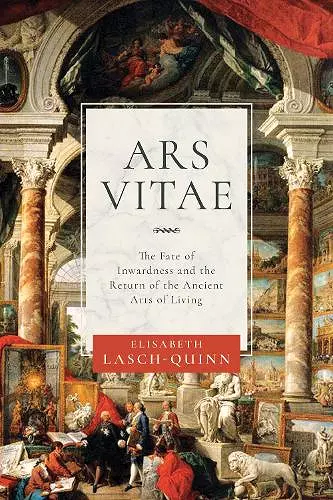Ars Vitae
The Fate of Inwardness and the Return of the Ancient Arts of Living
Format:Hardback
Publisher:University of Notre Dame Press
Published:15th Oct '20
Currently unavailable, and unfortunately no date known when it will be back
This hardback is available in another edition too:
- Paperback£23.99(9780268108908)

Despite the flood of self-help guides and our current therapeutic culture, feelings of alienation and spiritual longing continue to grip modern society. In this book, Elisabeth Lasch-Quinn offers a fresh solution: a return to classic philosophy and the cultivation of an inner life.
The ancient Roman philosopher Cicero wrote that philosophy is ars vitae, the art of living. Today, signs of stress and duress point to a full-fledged crisis for individuals and communities while current modes of making sense of our lives prove inadequate. Yet, in this time of alienation and spiritual longing, we can glimpse signs of a renewed interest in ancient approaches to the art of living.
In this ambitious and timely book, Elisabeth Lasch-Quinn engages both general readers and scholars on the topic of well-being. She examines the reappearance of ancient philosophical thought in contemporary American culture, probing whether new stirrings of Gnosticism, Stoicism, Epicureanism, Cynicism, and Platonism present a true alternative to our current therapeutic culture of self-help and consumerism, which elevates the self's needs and desires yet fails to deliver on its promises of happiness and healing. Do the ancient philosophies represent a counter-tradition to today's culture, auguring a new cultural vibrancy, or do they merely solidify a modern way of life that has little use for inwardness—the cultivation of an inner life—stemming from those older traditions? Tracing the contours of this cultural resurgence and exploring a range of sources, from scholarship to self-help manuals, films, and other artifacts of popular culture, this book sees the different schools as organically interrelated and asks whether, taken together, they can point us in important new directions.
Ars Vitae sounds a clarion call to take back philosophy as part of our everyday lives. It proposes a way to do so, sifting through the ruins of long-forgotten and recent history alike for any shards helpful in piecing together the coherence of a moral framework that allows us ways to move forward toward the life we want and need.
"Elisabeth Lasch-Quinn's engaging and learned Ars Vitae: The Fate of Inwardness and the Return of the Ancient Arts of Living is an intellectual tour de force that expounds various branches of ancient philosophy, assesses the scholarly debate around them, and critiques much of the modern appropriation of the classical heritage." —First Things
"The book is not a manual but instead a glimpse into, and an invitation to join, a conversation about what is good and how to live. . . . In the end, those who take up Ars Vitae may find themselves, as I did, most grateful to Lasch-Quinn for giving them grounds for hope." —VoegelinView
"Ars Vitae doesn't just stir the imagination—it stirs the scholarly imagination. It makes one think not simply about its subject but also how one might approach any subject. It is thus an example of both innovation and intervention." —Christian Scholar's Review
"Lasch-Quinn's forward-looking vision, developed through an impressive range of learning, ties wholeness, flourishing, selfhood, and health to goodness, truth, and beauty, which remain attainable through the most basic impulses and features of human life. That she makes her argument through accessible and upbeat engagements with everyday realities like literature, film, architecture, and coffee mugs (for which she has a real fondness) only proves her point." —The Christian Century
"Ars Vitae is a remarkable book. . . . The prose feels intensely personal, and even intimate, engaging the reader in the author's search for meaning with an approach that feels consequential without being personally needy." —Law and Liberty
"This is what makes Ars Vitae such vital reading. It provides both a thorough-going critique of the therapeutic, self-obsessed ethos so dominant today, and a way beyond it, through the potential development of those inner, moral resources on which true selfhood and a moral community rest." —spiked
"Lasch-Quinn turns to the ancients to persuade her readers that living, contra postmodernism, can bring us to 'the heights of awe, love, and wholeness,' even in the face of great pain and evil. . . . Many of us go through days, weeks, and even years of being beaten down, but suffering, Lasch-Quinn's book tells us, can be transfigured into beauty, even holiness. " —City Journal
"Lasch-Quinn has set out in Ars Vitae to embody the best of what true philosophical writing has to offer. She writes in a way that makes her readers better thinkers, more reflective and self-aware, and she does so by showing the development of her own thinking—who her influences are, the sources from which she draws her wisdom, and how philosophy informs her understanding of herself, the culture, and the world in which she lives." —Los Angeles Review of Books
"In her profoundly insightful and thought-provoking work, Elisabeth Lasch-Quinn . . . notes, 'the problems with contemporary culture stem in part from its inability, even in the event that basic needs are met, to provide adequate resources for the living of everyday life.' . . . Lasch-Quinn's work not only informs but urges the reader to seek a deeper understanding of the current problems we face." —Journal of Sociology and Christianity
"[Lasch-Quinn] is a gifted scholar whose examination of ancient works, their modern scholarly reception, and the appearance of big ideas in popular culture is consistently brilliant. . . . She manages to cover over two thousand years of philosophical development in under four hundred pages, and while those pages are dense in content, they are charmingly readable. The introduction, 'Therapeia,' is worth the price of the book." —Front Porch Republic
ISBN: 9780268108892
Dimensions: 238mm x 159mm x 37mm
Weight: unknown
480 pages
New edition